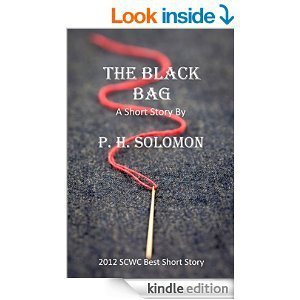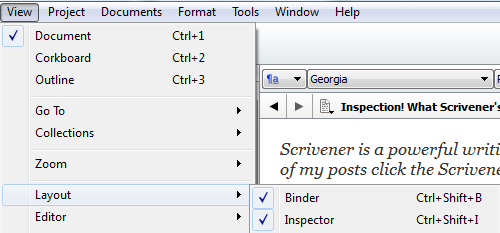Keywords & Project Searches in Scrivener
Scrivener is a powerful writing tool. I write about it weekly with tips and usage ideas. To read more of my posts click the Scrivener tag or category at the end of the page.
Follow Blog via Email
Enter your email address to follow this blog and receive notifications of new posts by email.
Recently, I’ve written a few posts about the Inspector and it value as well as using one of its features – Snapshots. Today, I’m following up on those posts with more about the Inspector’s features – this time examining Keywords in a little more detail.
First let’s cover the basics of getting to the Keywords on the Inspector. To turn on the Inspector click on View => Layout and then click on Inspector or use the keyboard shortcut: CTRL + Shift + I.
Next enter Keywords by clicking on the Inspector menu button at the bottom – it’s got the icon of a key as pictured here:
 You’ll see Synopsis and a card for Keywords, then the General Meta-Data and next the area where you can work with Keywords. Here you can click + or – to add keywords or the gear icon which has the same options plus the choice to show keywords. You can also access Keywords on the Projects menu and clicking Project Keywords (CTRL + Shift + O).
You’ll see Synopsis and a card for Keywords, then the General Meta-Data and next the area where you can work with Keywords. Here you can click + or – to add keywords or the gear icon which has the same options plus the choice to show keywords. You can also access Keywords on the Projects menu and clicking Project Keywords (CTRL + Shift + O).
So what’s important about keywords? These are words that make your project easily search-able and they are subset of managing Meta-Data which essentially is like using Post-It Notes you can color-code, etc. The same goes for Keywords and color-coding. This is a function that’s certainly handy while editing non-fiction. I can also see this function as highly useful in fiction projects – especially like fantasy and science-fiction where custom name usage is very common and important to keep consistent.
Follow Blog via Email
Enter your email address to follow this blog and receive notifications of new posts by email.
But why are searches important for your manuscript? Easily finding and editing details of keywords is important to all writers. For a fantasy writer like me, editing for consistency and spelling accuracy throughout the project is necessary. For example, I’m currently revising The Bow of Destiny for a detailed edit next month after which I’ll be revising again. Changes in key points may be necessary and I would want to create keywords to make sure I’m consistent throughout the manuscript. Likewise, I have a short story that’s almost ready for submission but needs a final edit. Tracking some keywords can help insure I keep details clear and consistent throughout the project.
In the coming weeks, I’ll discuss more about Meta-Data and its value. I also want to get into other cool Scrivener tools that may just help you as you write.
 Please share your thoughts and ideas in the comments section. I’d also love to connect with you over social media so check my Contact page for that information. See the News page for announcements and remember to sign-up to receive news and posts by email. I’ve added a new sign-up tab on my FaceBook page to simplify the process. New followers can download The Black Bag via free coupon today! Also, the cover of my book, The Bow of Destiny, was revealed recently so take a look.
Please share your thoughts and ideas in the comments section. I’d also love to connect with you over social media so check my Contact page for that information. See the News page for announcements and remember to sign-up to receive news and posts by email. I’ve added a new sign-up tab on my FaceBook page to simplify the process. New followers can download The Black Bag via free coupon today! Also, the cover of my book, The Bow of Destiny, was revealed recently so take a look.
Follow Blog via Email
Enter your email address to follow this blog and receive notifications of new posts by email.
Just as a note: I am not affiliated with Scrivener in any official capacity. For support questions, pricing and other concerns please contact the vendor.
Filed under: Blogging, Creativity, Editing, Fantasy, Fiction, Indie Publishing, Planning, Scrivener, Self-publishing, Short Fiction, Short Stories, Social Media, Tech Tips, The Black Bag, The Bow of Destiny, Tips, Twitter, Writing Tagged: blogging, Coverart, creativity, Editing, Facebook, Fantasy Fiction, Formatting, Indie Publishing, Keywords, P. H. Solomon, Scrivener, Self-publishing, Short Stories, Social Media, The Black Bag, The Bow of Destiny, Tips, Twitter, writing















